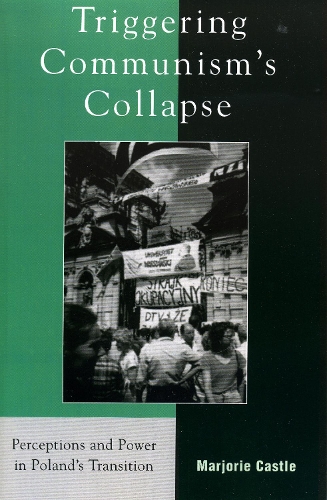
Triggering Communism's Collapse: Perceptions and Power in Poland's Transition
(Paperback)
Publishing Details
Triggering Communism's Collapse: Perceptions and Power in Poland's Transition
By (Author) Marjorie Castle
Bloomsbury Publishing PLC
Rowman & Littlefield Publishers
1st November 2005
United States
Classifications
Tertiary Education
Non Fiction
Regional / International studies
320.53209438
Physical Properties
Paperback
258
Width 151mm, Height 229mm, Spine 19mm
413g
Description
Why was Poland the first communist regime to collapse And yet why do many Poles see their peaceful transition away from communist rule as a sham, rather than a victory To find answers to these questions Triggering Communism's Collapse examines the political dynamics of the Polish transition-a transition that stripped the communist party of its control of the government, thrust an opposition leader into the premiership, and set off the world-changing series of communist collapses in the Soviet Bloc. At a time when Poland's economy was deteriorating, the workers were striking, and the Soviets were vacillating, both the Polish communist regime and the Solidarity-led opposition formulated certain expectations and acted upon them. Both sides' expectations soon turned out to be mistaken, but the resulting choices shaped the course of events in surprising ways. Through elite interviews and archival records, Castle shows how mistaken expectations resulted in a sudden transfer of power away from the communist elite and created a new political arena full of surprises. Drastic changes in the capabilities of key political actors had radically altered the implications of negotiated rules. Yet these rules went on to change the political landscape itself.
Reviews
Poland's transition from communism to democratic government was a critical signal that the rejection of communism throughout Eastern Europe was possible, yet many Poles view the transition process and its outcome as a disappointment, rather than a moment of national pride. Marjorie Castle investigates this paradox by examining the Polish roundtable discussions between the communist regime and a coalition of opposition groups in 1989 that led to the election in August 1989 of the first noncommunist head of government in eastern Europe, Solidarity adviser Tadeusz Mazowiecki. . . . Castle's analysis of the roundtable is a welcome addition, and probably the most comprehensive such investigation in English. Her discussion is fluid and engagingpractically a page-turner. -- Renee De Nevers, Syracuse University * Slavic Review *
An excellent analysis of the 1989 elections in Poland that heralded the beginning of the anticommunist revolutions in that year within Eastern Europe. * Choice Reviews *
Author Bio
Marjorie Castle has taught at Temple University, Tulane University, and the University of Utah.
